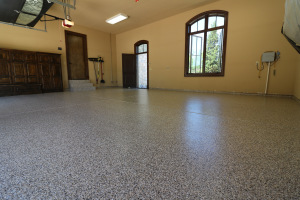Seal Garage Floor or Not? – Pros and Cons of Concrete Sealing
There are probably no other floors as hardworking as garage floors. They carry the weight of the vehicles and all other stored items in the garage. They are exposed to spilled oil, chemicals, and grease. They take abuse from falling tools. For these reasons professional concrete contractors recommend sealing concrete garage floors. Here is a brief look at the pros and cons of concrete sealers.

Not in Pennsylvaina? Find a SUNDEK garage floor contactor near you!
Pros of Concrete Sealing
- Sealers help a concrete garage floor repel moisture. Concrete is a very porous material. A layer of sealer seals the pores, keeping it from absorbing any moisture on it.
- A layer or two of sealer will help extend the lifespan of a garage floor. It serves as a protective layer that keeps damaging elements at bay.
- Sealing the garage floor helps enhance its aesthetics. Epoxy flooring, for example, dries to a really high gloss, making the floor look polished and shiny.
- If you have a colored concrete garage flooring, sealers can help keep the color from fading, flaking, or peeling off.
- Sealers keep any type of liquid from staining the garage floor. Remember how easy it was for grease and oil to leave ugly stain marks on the floor? With a layer of sealer, the grease and oil stay on the surface, making it easy to wipe away completely.
Cons of Concrete Sealing
- Sealer application is an additional expense for the homeowner. The wider the floor area, the more sealer is needed, the more expensive it will be.
- Some concrete sealers dry glossy, making the surface less slip-resistant. However, fine aggregate can be added for a non-skid texture when it dries.
- Sealers will dull and fade after a few years. Faster if the garage floor experiences heavy vehicle and foot traffic. Reapplication is required every couple of years.
- Sealing products can not be used on newly poured concrete. Homeowners should wait 28 to 30 days for the concrete to completely cure. Applying sealer too early will be detrimental to the durability of the new concrete slab.
- Some sealers are made of chemicals that may be dangerous to humans and the environment. Safer versions are available but might cost more than traditional sealing products.